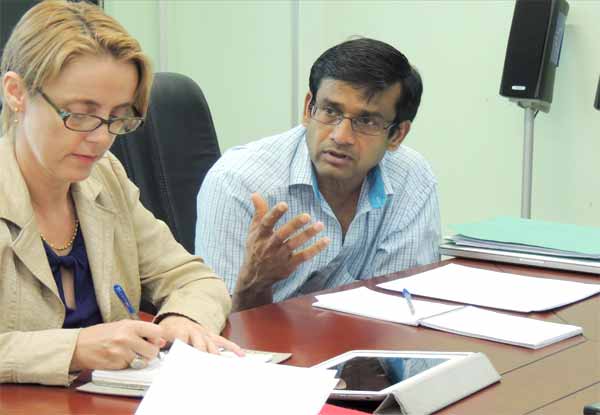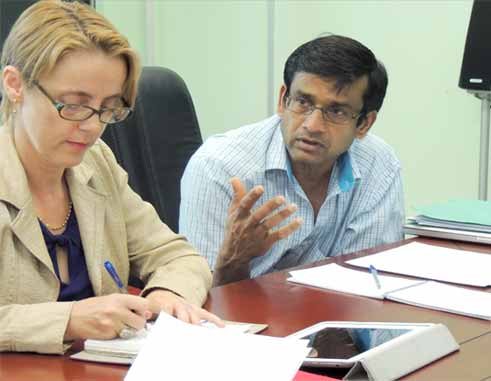The Business And Professional Services.

BUSINESS and Professional Services are among the key service sectors identified as having tremendous potential for growth, especially as it relates to service exports. The business and professional services being targeted for assistance (incentive regimes, institutional support, regulation) through the impending Services Policy, Strategy and Action Plan include Accounting, Architecture, Engineering, and Management Consulting.
The Global Picture
As part of the CARTFund Project, NEX Consulting was contracted to develop an export development platform for key service sectors in St. Lucia. This article contains their findings as it relates to St. Lucia’s prospects for outsourcing finance and accounting (FA) services.
Global markets for business and professional services are large and growing rapidly with an increasing proportion of outsourcing going abroad (offshoring). Within the offshoring market, the trend is towards a mix of offshoring basic functions to a low-cost destination whilst near-shoring higher value functions has created opportunities for Caribbean countries.
However, St. Lucia does not have the critical mass of even medium-sized firms necessary to compete in the international market for business and professional services. More importantly, St. Lucia does not have a substantial cost advantage in the provision of these services.
Regional markets, especially the OECS, provide the best opportunities for St. Lucia’s business and professional service providers. At the broader CARICOM level, they must compete with larger and more developed service economies like Barbados, Jamaica and Trinidad. Be that as it may, the possibility of attracting specialist outsourcing firms looking for a near-shore presence in finance and accounting services should be explored.
Finance and Accounting Services – Industry Trends
Outsourcing of finance and accounting functions is a well-established trend that has been growing rapidly. The pattern looks set to continue over the medium to long term.
The global outsourcing market for finance and accounting is valued at close to $50 billion. The range of services being outsourced include book-keeping, accounts receivable, accounts payable as well as more complex activities such as budget forecasts and risks management. India remains the market leader and the US the largest market. It is estimated that 80 – 90 percent of finance and accounting activity outsourced by US companies is sent offshore, specifically India and Eastern Europe. The cost savings from outsourcing finance and accounting functions are estimated to be between 20 and 30 percent. When the functions are moved offshore, the cost savings can range from 32% to as high as 50%, especially when outsourcing to India.
The local accounting industry is well developed and is able to offer quality services across a wide range of specialties. The Institute of Chartered Accountants of St. Lucia is well established and has been effective in regulating the domestic industry.
The structure of the private practice accounting industry is similar to the legal profession, in that there are a few large firms. There are only three sizeable accounting firms on island with more than one partner. The rest of the accounting landscape is dominated by firms with just one or two partners. All of these firms are limited in terms of the range of services they can offer for export and lack the resources to handle large projects. Most firms have concentrated on serving the domestic market, in particular, providing services to the financial sector.
Given current cost levels, the quality of service offered, the attractiveness of the location and the proximity to the US market, St. Lucia might be able to attract nearshore outsourcing of finance and accounting functions in the Canadian mode. The disadvantage St. Lucia has in comparison to Canada, is the size of its firms. One or two-person operations do not have the resources to market service exports effectively. They do not have the scale to cope with even mid-sized outsourced work, and they cannot project the type of corporate image required to convince clients to outsource key functions, even though the capability may well exist.
These constraints could be addressed through inward investment from existing FA outsourcing providers seeking a nearshore location to serve the US; and development of strategic partnerships using contracts in the diaspora to generate export possibilities.
The accounting profession is subject to the least legislative and regulatory scrutiny in St. Lucia. To practice in the OECS, an Accountant should be affiliated to the Eastern Caribbean Institute of Chartered Accountants, which is headquartered in St. Lucia. Of the six OECS jurisdictions, only Antigua and Barbuda has dedicated legislation in the form of the Accountancy Profession Act of 1992, although no regulations have been developed. The profession is not individually regulated in all OECS countries but the Institute of Chartered Accountants Agreement Act (which has been passed in all member states) contains provisions on certification, membership and registration. The Act also provides for the general self-regulation of the accountancy profession and functions as the national legislation on accountancy services for member states which have passed the Act.
Under the Act (which has not been implemented) there should be detailed regulations on certification, requirements for educational attainment, relevant degree, practical training and required number of years of experience, as well as provisions on auditing. Independent accountants should have indemnity insurance. There should also be a Code of Conduct and accountants should be subject to a quality assurance system, based on peer review. These requirements, if instituted, will bring accountants in the region closer to the standards of the North American counterparts.
However, to date, little progress has been made in introducing the relevant regulations. While the domestic regulatory framework for accountancy seems deficient, the global nature of the profession means that international standards are being met anyway. Most qualified accountants are trained either to the standards of the Association of Chartered Certified Accountants (ACCA), the Certified General Accountants Association of Canada (CGA-Canada) or the Chartered Institute of Management Accountants (CIMA).
The Institute of Chartered Accountants of the Caribbean (ICAC) has common standards that meet international requirements. ICAC is also engaged in discussions on mutual recognition of qualification and licensing requirements regionally. St. Lucian accountants need to become involved in this process, if they are serious about seeking contracts from foreign clients, or exporting their services to markets beyond CARICOM.
The big multinational accounting firms such as KPMG Deloitte Touche, Ernst & Young, and Price Waterhouse Coopers, now Grant Thornton – focus on domestic clients in each island. While the multinational brands are all over the world, indigenous accountants in St. Lucia and the rest of CARICOM are not really looking overseas for outsourced work or contracts. It is therefore unlikely that St. Lucia will be able to export accounting services beyond CARICOM, since indigenous or domestic accounting firms are not export oriented, and are too small. In the final analysis, St. Lucia is not cost-competitive globally, compared to business process outsourcing leaders such as India and Malaysia.
It is hoped that the impending services policy will contain recommendations and strategies to stimulate growth in the finance and accounting practice aimed at increasing competitiveness, revenue and service exports in the sector.














